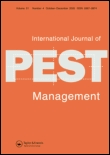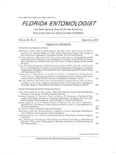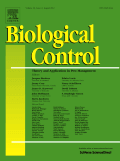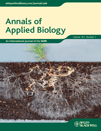
Journal of Integrated Pest Management
Scope & Guideline
Empowering research for a pest-free future.
Introduction
Aims and Scopes
- Integrated Pest Management (IPM) Strategies:
The journal emphasizes research on IPM strategies that combine multiple control methods to reduce pest populations while minimizing environmental impact. - Ecology and Biology of Pests:
Research on the ecology and biology of various pest species is central to the journal, providing insights that inform management practices. - Farmer and Stakeholder Engagement:
The journal explores the perceptions and practices of farmers and stakeholders regarding pest management, highlighting the importance of education and community involvement. - Impact Assessment of Pest Management Practices:
The journal publishes studies assessing the impacts of different pest management practices on crop yields, pest resistance, and ecosystem health. - Emerging Pests and Invasive Species:
Research on newly identified pests and invasive species is a critical focus, addressing the challenges they pose to agriculture and ecosystems.
Trending and Emerging
- Climate Change and Pest Management:
Research addressing the impacts of climate change on pest populations and management practices is increasingly prevalent, highlighting the need for adaptive strategies. - Pollinator Conservation and Management:
There is a growing emphasis on the role of pollinators in integrated pest management, with studies focusing on practices that support pollinator health alongside pest control. - Community and Stakeholder Involvement:
Emerging themes include the involvement of local communities and stakeholders in pest management practices, emphasizing participatory approaches and knowledge sharing. - Biological Control and Biopesticides:
Research on biological control agents and the use of biopesticides is trending, as these methods align with sustainable agriculture goals. - Technology in Pest Monitoring and Management:
The integration of technology, such as remote sensing and data analytics, into pest monitoring and management practices is gaining traction, reflecting advancements in agricultural practices.
Declining or Waning
- Traditional Chemical Control Methods:
There is a noticeable decline in research focused solely on traditional chemical control methods, reflecting a shift towards more sustainable and integrated approaches. - Generalized Pest Management Practices:
Research that does not consider specific pest species or localized management practices is becoming less frequent, as there is a growing emphasis on tailored IPM strategies. - Historical Pest Management Approaches:
Studies centered on historical pest management methods are waning, as the journal increasingly prioritizes innovative and contemporary approaches to pest management.
Similar Journals

BIOCONTROL
Fostering environmentally responsible practices in insect science.BIOCONTROL is a leading academic journal published by Springer, focusing on the intricate dynamics of biological control in agronomy and insect science. Established in 1998, this journal has effectively contributed to the field’s understanding of pest management and sustainable agriculture practices. With a commendable impact factor and category rankings placing it in the Q1 quartile for both Agronomy and Crop Science as well as Insect Science, it ranks among the top-tier journals in its domain. The journal is accessible to a broad audience, offering a comprehensive platform for researchers and practitioners to share innovative findings and methodologies. By fostering the advancement of knowledge in biological control, BIOCONTROL plays an essential role in promoting environmentally responsible practices that address contemporary agricultural challenges. Engage with the latest research and developments from the Netherlands and beyond, as we explore the future of sustainable agriculture in an ever-evolving landscape.

Egyptian Journal of Agronomy
Connecting Science and Sustainability in AgricultureEgyptian Journal of Agronomy, published by the NATL INFORMATION DOCUMENTATION CENT, ACAD SCIENTIFIC RESEARCH & TECHNOLOGY, serves as a pivotal platform for researchers, professionals, and students focusing on various disciplines within the agricultural sciences, including agronomy, soil science, horticulture, and ecology. With an ISSN of 0379-3575 and E-ISSN of 2357-0288, the journal aims to bridge the gap in knowledge and innovation in the field with its comprehensive studies and frameworks. While the journal is currently categorized in low Scopus ranks, indicating immense potential for growth in influence and impact, it remains dedicated to providing quality research and fostering advancements in agronomic practices. Set in Egypt, a hub for agricultural research, the journal is committed to reflecting the regional and global challenges in agriculture. The Egyptian Journal of Agronomy is a vital resource for anyone engaged in the evolving landscape of agricultural science, offering insights that promote sustainable practices and address current issues facing the sector.

INTERNATIONAL JOURNAL OF PEST MANAGEMENT
Bridging the gap between research and real-world pest management solutions.The INTERNATIONAL JOURNAL OF PEST MANAGEMENT, published by TAYLOR & FRANCIS LTD, is a prestigious academic journal that has established itself as a vital resource in the fields of Agronomy, Crop Science, and Insect Science. With an ISSN of 0967-0874 and E-ISSN 1366-5863, this journal has been disseminating critical research since its inception in 1993 and continues to shape the discourse through to 2024. The journal occupies a significant position in the academic community, currently ranked Q2 in Agronomy and Crop Science and Q3 in Insect Science, based on its impressive Scopus ranks (Agricultural and Biological Sciences: Insect Science rank #33/181; Agronomy and Crop Science rank #109/406). Offering rapid insights into pest management strategies, this journal is essential for researchers, professionals, and students seeking to enhance their understanding of pest dynamics and management practices in an agronomic context. Though it does not provide open access options, its rigorous peer-review process ensures high-quality, impactful publications that contribute significantly to sustainable agricultural practices.

Revista de Agricultura Neotropical
Fostering Collaboration in Agricultural ScienceRevista de Agricultura Neotropical, published by UNIV ESTADUAL MATO GROSSO SUL, serves as a pivotal platform for disseminating research in the fields of agronomy and crop science. Since its inception as an open-access journal in 2014, it has been dedicated to promoting innovative research and practical applications within the agricultural sector, specifically tailored to the challenges and dynamics of the tropical agriculture landscape in Brazil and beyond. Although currently positioned in the Q4 quartile of Scopus rankings, and with a modest agricultural science percentile, the journal actively encourages contributions that highlight sustainable agricultural practices, tropical crop management, and emerging technologies in farming. With its commitment to open access, the Revista de Agricultura Neotropical broadens the reach of critical knowledge, making it accessible to researchers, professionals, and students alike, thus fostering a collaborative environment for advancing agri-scientific initiatives.

Turkish Journal of Agriculture and Forestry
Elevating scientific discourse in forestry and agriculture.Turkish Journal of Agriculture and Forestry, published by the Tubitak Scientific & Technological Research Council Turkey, stands as a significant platform for disseminating impactful research in the fields of agriculture, forestry, and ecological sciences. With an ISSN of 1300-011X and an E-ISSN of 1303-6173, this esteemed journal has maintained its commitment to advancing scientific knowledge since its inception in 1994 and continues to provide peer-reviewed content through 2024. The journal has earned a commendable Q2 ranking in multiple categories, including Ecology, Food Science, and Forestry, as well as impressive Scopus rankings within its respective categories, placing it in the top quartiles of its fields. This positions the Turkish Journal of Agriculture and Forestry as a critical resource for researchers, professionals, and students seeking to explore innovative solutions and significant advancements in agricultural practices and ecosystem management.

FLORIDA ENTOMOLOGIST
Advancing the Frontiers of Insect ScienceFLORIDA ENTOMOLOGIST is a prestigious peer-reviewed journal dedicated to the advancement of entomological sciences, published by Walter de Gruyter GmbH. Since its transition to open access in 1994, the journal has become a vital resource for researchers, students, and professionals in the fields of Insect Science and Ecology, Evolution, Behavior, and Systematics. With an impact factor ranking high in its category—Q2 in Insect Science and Q3 in Ecology, Evolution, Behavior and Systematics—the journal showcases significant findings and contributions that shape our understanding of insect biology and its implications for ecological systems. The journal is indexed in Scopus, further establishing its relevance, with current rankings reflecting its competitive standing within Agricultural and Biological Sciences. Published continuously since 1982, FLORIDA ENTOMOLOGIST not only facilitates the dissemination of knowledge among entomologists but also encourages interdisciplinary collaboration, making it an essential publication for anyone invested in the scientific study of insects.

BIOLOGICAL CONTROL
Connecting Scholars to Shape Sustainable AgricultureBIOLOGICAL CONTROL, published by Academic Press Inc Elsevier Science, is a prestigious journal focusing on the advancement of knowledge in the field of biological pest control and integrated pest management. With a high-impact factor reflecting its significant contributions to agronomy and insect science, it has secured elite positions in both Q1 categories as of 2023. The journal ranks within the top 6% and 12% of its fields on Scopus, making it an essential resource for researchers and professionals dedicated to sustainable agricultural practices and ecological balance. With its comprehensive exploration of theoretical and applied studies from 1991 to 2024, BIOLOGICAL CONTROL serves as a critical platform for disseminating innovative research and promoting dialogue among scholars, students, and practitioners. Although the journal follows a subscription-based access model, it consistently attracts contributions that shape the future of pest management strategies.

Romanian Agricultural Research
Pioneering Research in Crop Management and SustainabilityRomanian Agricultural Research is a prominent academic journal dedicated to advancing the field of agricultural science with a specific focus on agronomy and crop management. Published by the NATL AGRICULTURAL RESEARCH & DEVELOPMENT INST in Romania, this journal has established itself as an important resource within its discipline, evidenced by its Q3 ranking in the Agronomy and Crop Science category for 2023. With its ongoing publication since 2008, the journal provides a platform for researchers and professionals to disseminate their findings and share innovative practices that address the challenges faced in agricultural development. Although it operates under a non-open access model, Romanian Agricultural Research commits to rigorous peer-review processes, ensuring the high-quality content that enhances the academic community’s knowledge base. The journal's objective is to foster dialogues surrounding sustainable agriculture, improve crop yield, and contribute to the enhancement of agricultural practices globally. Researchers, professionals, and students will find this journal to be an invaluable repository of knowledge and a catalyst for future agricultural innovations.

Zemdirbyste-Agriculture
Bridging research and practice in the heart of Lithuania.Zemdirbyste-Agriculture is a prominent journal dedicated to advancing the field of agricultural sciences, with a particular focus on agronomy and crop science. Published by the Lithuanian Research Centre Agriculture & Forestry, this open access journal has been fostering knowledge sharing and scientific discourse since 2004, allowing researchers, professionals, and students unrestricted access to its content. Located in the beautiful country of Lithuania, specifically at Vytautas Magnus University, this journal plays a significant role in disseminating innovative research findings. With a 2023 Scopus ranking of #246 out of 406 in the category of Agricultural and Biological Sciences, Zemdirbyste-Agriculture falls within the Q3 quartile, reflecting its growing influence in the academic community. This journal, which has converged its publication focus from 2008 to 2023, aims to provide a platform for scientists to share their critical insights on agricultural practices, sustainability, and technological advancements in crop science, thereby contributing to the global discourse on food security and environmental health.

ANNALS OF APPLIED BIOLOGY
Fostering breakthroughs in applied biological research.Annals of Applied Biology, published by Wiley, stands as a pivotal resource in the fields of Agronomy and Crop Science, boasting an impressive impact factor that reflects its significance and influence in the academic community. With a storied history dating back to 1914, this journal serves as a comprehensive platform for innovative research and applied studies in agricultural biology, specifically aimed at improving crop production and sustainable practices. Currently categorized in the Q1 quartile for Agronomy and Crop Science in 2023, it ranks an admirable 82 out of 406 in the Scopus database, placing it within the top 79th percentile of its category. Researchers, professionals, and students worldwide rely on the Annals of Applied Biology for cutting-edge insights and advancements in applied biological research, making it a vital component of the scientific discourse aimed at addressing pressing agricultural challenges. Please note that this journal does not offer open access options, thus ensuring a rigorous peer review process and the integrity of published work.